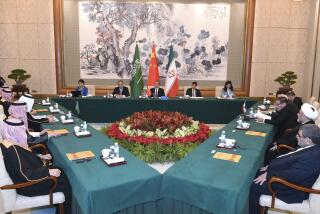NEWS ANALYSIS : Gulf Security Effort Falters Again as Talks Are Canceled
NICOSIA, Cyprus — The promise of Arab realignment under the Gulf War coalition has slipped another notch with cancellation of today’s meeting in Kuwait city on a regional security force.
Touted in the first week of the Iraqi defeat as a vehicle of self-sufficiency, combining Gulf money with Egyptian and Syrian muscle, the security plan has been stumbling ever since. Officials in Cairo and Kuwait blamed scheduling conflicts and unfinished preparations for the cancellation, but deepening differences between the Gulf states and the two Arab powers was clearly the cause.
According to reports from the Gulf, Kuwait and its five partner nations in the Gulf Cooperation Council favor a security plan built around quick-strike Western air and naval forces, with a possible role for non-Arab Iran, which controls the eastern shore of the oil-rich waterway. Egypt is particularly suspicious of an Iranian role, and in the past two weeks a nasty propaganda war has broken out between Cairo and Tehran.
Beyond politics, the establishment of a security system held the promise of Gulf financial aid for Egypt and Syria. When the so-called Six Plus Two arrangement was initially agreed upon in Damascus on March 6, some participants spoke of billions of dollars in developmental funds going to Cairo and Damascus, which, respectively, sent 38,000 and 19,000 troops to Saudi Arabia under the American-led Desert Storm coalition.
But a month after the concept was enshrined in the so-called Declaration of Damascus, Egyptian President Hosni Mubarak ordered his troops home from the Gulf. He gave no reason, but Middle Eastern diplomats said he was miffed both by Kuwaiti preference for an American backbone to Gulf security and by the sheikdom’s tilt to U.S. rather than Egyptian firms on war reconstruction contracts. More recently, Damascus officials have complained that Kuwait has been late in delivering promised financial support for Syrian troops.
Within the Gulf Cooperation Council, efforts got under way to water down the commitments made to Egypt and Syria in the heady coalition atmosphere of the Damascus conference. An emerging formula would invite any or each of the six GCC countries--Kuwait, Saudi Arabia, Bahrain, Qatar, Oman and the United Arab Emirates--to deal individually with Egypt and Syria for retaining some wartime forces in the region.
Iran’s insistence on a role in the security of what it calls the Persian Gulf and its neighbors term the Arab Gulf has also shaken the tenets of the Damascus Declaration, which said Syrian and Egyptian troops would provide the nucleus of a security force. Even before the war, Tehran, noting President Bush’s demand for new security arrangements, declared that there could be no security without Iranian participation.
Last month, Iranian Deputy Foreign Minister Ali Besharati growled that Egypt and Syria deserved no role in Gulf security because they did not border the waterway. Besharati’s remarks, which may have been sharpened by internal debate, set off Egyptian Foreign Minister Amir Moussa.
“The starting point in Gulf security is Arab,” he told Egyptian reporters, “and there can be no discussion or implementation of any security order in the Middle East without a role for Egypt, since Egypt is the biggest of the region’s states and the most influential internationally and regionally, militarily and politically.”
With the heat rising between Tehran and Cairo, which supported Iraq in the Iran-Iraq War, Syria kept quiet on the security debate.
Washington has announced that it intends to eventually withdraw all American ground forces from the region--they now number about 10% of their wartime levels--but some Gulf states support a strong U.S. and British air and naval force. Washington and London appear agreeable.
With the primary muscle supplied by the West, Gulf security would fall short of the political goal of the Damascus Declaration: a coalition of Arab forces policing their own affairs.
More to Read
Sign up for Essential California
The most important California stories and recommendations in your inbox every morning.
You may occasionally receive promotional content from the Los Angeles Times.










